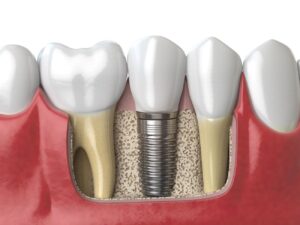Missing teeth can create many complications for a dental patient when it comes to their oral capabilities, smile aesthetics, and overall health. They can work with their dentist to replace missing teeth and restore their smiles. The most beneficial tooth replacement treatment is dental implants.
These fixtures use a titanium post anchor in the jaw that fuses with the bone there to create a solid foundation that supports prosthetic teeth. Then patients can feel confident with a permanent restoration to enhance their smiles in the wake of tooth loss.
But dental implants have a minute risk of failing, which will require urgent attention from a dentist to fix. Knowing more about this complication in implant dentistry can help you to avoid it. Find responses from your dentist to frequently asked questions about dental implant failure by reading on.

How Can I Tell If a Dental Implant Is Failing?
A successful dental implant features an anchor fused properly with the jawbone for a secure fit in your smile. But if this fusion process does not happen correctly, you can have an ill-fitting implant that will put your oral health in danger. This is dental implant failure.
The implant may feel loose in your mouth and seem to wobble in the event of this dental problem. If you struggle to complete your usual oral functions, like eating or speaking, you could have a failing dental implant.
Many dental patients will primarily feel a great deal of pain in the case of dental implant failure. If pain management advice from aftercare guidelines from your dentist does not relieve this discomfort, you should tell your dentist right away. Also, the gums might swell or recede around the implant if it begins to fail.
All of these complications are abnormal, and you should not delay seeking treatment for the issue from your dentist. Implant failure will not resolve on its own. Ignoring this complication may put you at risk of an oral infection, which will mean more extensive dental work to restore your smile.
How Will My Dentist Treat a Failing Dental Implant?
Treatment for a failing dental implant includes removal of the fixture. The dentist will thoroughly clean the area around the implant, including the gums. They will also evaluate the condition of the jawbone.
Sometimes, the jawbone may suffer deterioration which will need a bone graft to add stability to the area once again. If you want another dental implant to restore your smile, you will need enough healthy jawbone to sustain the implant. Discuss further tooth replacement solutions with your dentist after treating the failing implant.
How Can I Avoid Dental Implant Failure?
Before pursuing implant dentistry, your dentist will evaluate your oral health, including your gums and jawbone, to ensure you are an ideal candidate. Checking your gums and jawbone structure reduces the chance of failure for the fixture.
To further avoid dental implant failure, you should follow your dentist’s aftercare instructions. This allows for the implant to heal properly and therefore fuse with the jawbone effectively. Maintain good oral hygiene habits so that your teeth and gums continue to stay healthy and strong enough to support the implant.
